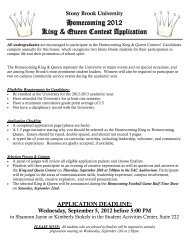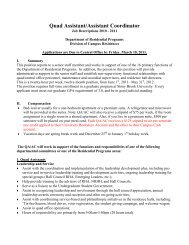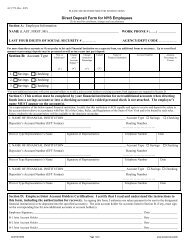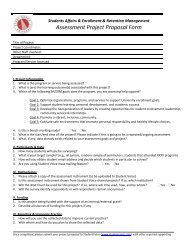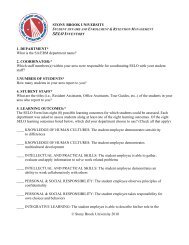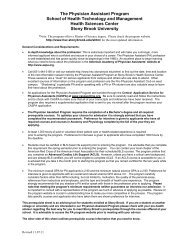PreLaw Guide - Student Affairs - Stony Brook University
PreLaw Guide - Student Affairs - Stony Brook University
PreLaw Guide - Student Affairs - Stony Brook University
You also want an ePaper? Increase the reach of your titles
YUMPU automatically turns print PDFs into web optimized ePapers that Google loves.
Letters of Recommendation<br />
• A person who knows you well can write a more substantial and helpful letter than someone who<br />
hardly knows you. In choosing between a person who taught you in a small class versus someone with<br />
a famous name or title but who cannot write a personal letter, choose the former. Letters from graduate<br />
student instructors are acceptable.<br />
• When asking for the letter, make sure that you make an appointment to meet with the person whom<br />
you are asking. Don’t ask for a reference over email. Bring your resume, transcript, and tests/papers<br />
from classes taken with the faculty member and be prepared to talk about your future goals and past<br />
achievements. Applicants should include on their resume their current and permanent address, current<br />
and permanent phone number, <strong>Stony</strong> <strong>Brook</strong> ID number, e-mail address, education (including all colleges<br />
attended and study abroad experiences), GPA, honors and awards (describe them), extracurricular<br />
activities, skills, language proficiency, and employment history. A sentence/bullet point describing the<br />
nature of the experience should accompany each activity or experience and it should indicate start and<br />
end dates.<br />
• Make sure that you allow the person the option of saying NO. You want to have strong letters and if<br />
a person is somewhat uncomfortable writing for you or doesn’t have enough time, it is likely that the<br />
result will be short and weak. It is much better to have someone be honest with you at the start, so<br />
that you can find another person to write your recommendation who will be more enthusiastic.<br />
• Give those writing recommendations plenty of advanced notice and time to write a good letter of recommendation<br />
(a month or even two), but also give them a deadline. Make sure that they know your<br />
application timeline.<br />
• Give those writing recommendations the LSAC Letter of Recommendation form and a stamped envelope<br />
addressed to LSAC.<br />
• Should you waive my right to see the recommendation letters The general feeling is that the person<br />
writing your recommendation will be more candid if it is a closed letter. The choice is yours. You must<br />
either waive or not waive your rights to see all the recommendations as well as your Dean’s Certification.<br />
Write a thank you note following your initial request for the letter, thanking the individual for<br />
agreeing to write the letter.<br />
• What is the total number of recommendations I should submit LSAC will accept up to four letters of<br />
recommendation.<br />
• It is not necessary for those writing recommendations to write targeted letters to each law school. A<br />
generic law school recommendation letter is fine unless the school specifically requests otherwise. It is<br />
also not necessary to give those writing recommendations the school-specific recommendation forms.<br />
• Inform your writers when you have decided where you will be attending school and thank them again<br />
for their assistance and support.<br />
p 10





